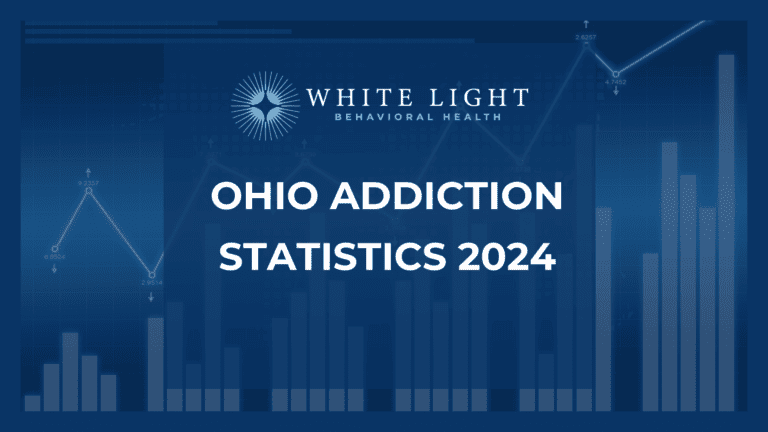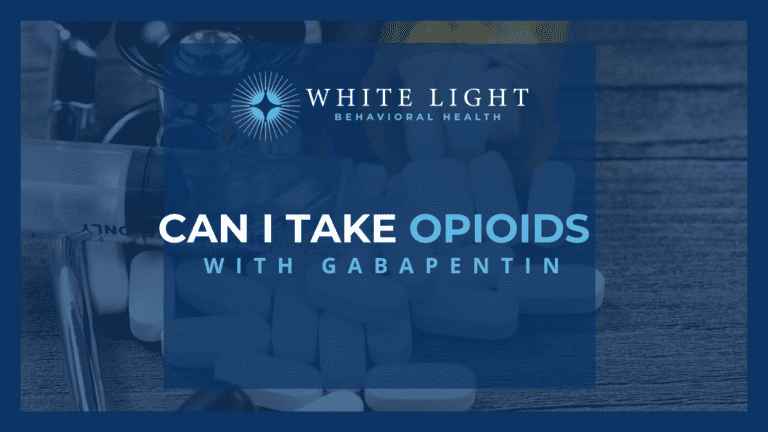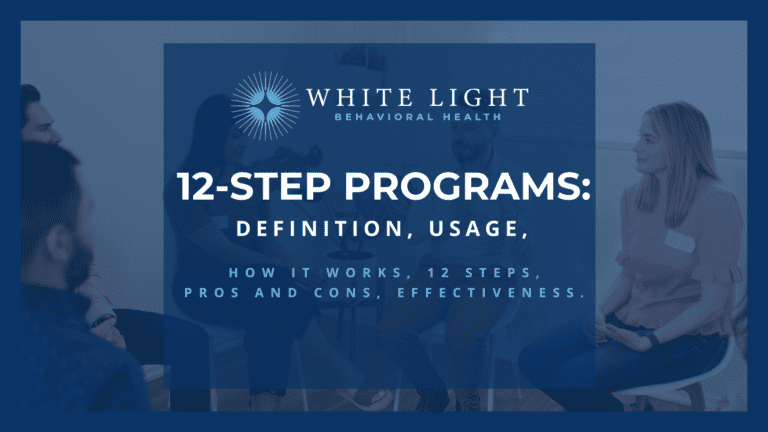In Ohio, the diverse paths leading to substance use, from stress relief and cultural influences to peer pressure, are as complex as the individuals themselves. The CDC’s 2013 Prevention Status Report highlights a concerning trend, with 20% of Ohio adults admitting to binge drinking, alongside widespread use of drugs like heroin, cocaine, and marijuana. This landscape contributes to a high rate of substance dependency across the state. If you’re struggling with controlling your substance use, White Light Behavioral Health offers a solution.

Our detox services at White Light Behavioral Health provide a comprehensive approach to overcoming substance use disorder. We offer specialized detox programs aimed at addressing the physical and psychological aspects of addiction. With a dedicated team and a supportive setting, we’re here to assist you through the initial, crucial step towards a healthier, substance-free life. Join us at White Light Behavioral Health, where recovery is within reach.

What Is Medical Detox?
At White Light Behavioral Health, medical detox is a critical first step in addiction recovery, distinctly different from the common notion of detox related to diet cleanses. This process involves the professional medical removal of addictive substances under the watchful eye of our experienced medical team, including physicians, nurses, and therapists.
Addiction, much like chronic conditions such as diabetes, requires ongoing management. Medical detox at White Light serves to stabilize the immediate crisis of addiction, similar to how an emergency room treats acute episodes of chronic diseases. It’s the essential first phase of a comprehensive treatment plan, setting the stage for a successful long-term recovery journey. Completing medical detox increases the likelihood of longer treatment retention and sustained sobriety.
How Do You Know It’s The Right Time For Detox?
If you realize that you manifest signs of drug and alcohol dependence, it’s probably time to detox and reduce the rate at which you consume these substances. But what are the signs that you have become dependent on these drugs?
You Will Start Neglecting Your Responsibilities
This is the most devastating sign of drug and alcohol dependence. If you are a parent, you might start neglecting your children or start physically abusing them. Some become violent toward their spouses, leading to constant conflicts or divorce. Taking care of yourself may also stop being a priority as you could start eating unhealthy food or stop eating entirely due to losing your appetite.
Constant Lies to Your Loved Ones
You will also realize that you usually constantly lie about your whereabouts and struggles with drug dependence to evade other people’s reactions, especially your family members. This is because you do not want them to worry about you or try and talk you out of your dependence issue. You may also start lying to get money for more alcohol and drugs if you are broke or to avoid arguments with your family members.
Frequent Blackouts
Blackouts usually become a norm when you take drugs or alcohol in large quantities. You may also find it hard to remember the day’s events because drugs block the transfer of memories from short-term to long-term storage.
Loss of Control
You will hardly be able to control how often you consume drugs. With time, the amount of alcohol and drugs you consume increases, and you won’t be able to help it. This is because it becomes hard for your body to function normally without intoxication. You will also start losing control of your emotions and actions.
Your Life Revolves Around Drugs
You won’t stop thinking about your next drug and alcohol intake. You might even end up sneaking alcoholic drinks or other drugs into your workplace so that you can accomplish your work duties and get through the day. In addition, you will no longer be interested in things that used to excite you, such as hobbies. This is because you would prefer spending most of your time drinking alcohol.
What Happens After Detox At White Light?
Detoxification is a crucial first step on the journey to recovery, but what comes after is equally important for achieving long-term sobriety. At White Light Behavioral Health, we understand that each individual’s path to recovery is unique, which is why we offer a comprehensive range of post-detox programs designed to meet the diverse needs of our clients. Here’s what you can expect after completing detox with us:
- Residential Treatment Program: For those who need continued, intensive support, our Residential Treatment offers a structured environment with round-the-clock care. This program focuses on healing both the mind and body, providing therapy, group sessions, and activities designed to build a foundation for sobriety.
- Partial Hospitalization Program (PHP): As a step down from Residential Treatment, our PHP allows clients to receive intensive treatment during the day while returning home or to a sober living environment in the evenings. It’s ideal for those transitioning to more independence while still benefiting from a structured support system.
- Intensive Outpatient Program (IOP): Our IOP is designed for clients who need a flexible treatment schedule that can accommodate work, school, or family responsibilities. It provides a supportive network and focuses on relapse prevention, coping strategies, and integrating recovery into daily life.
- Outpatient Program (OP): For clients ready to resume their normal daily activities but still requiring support, our OP offers a less intensive level of care. It includes therapy sessions and access to support groups, helping clients maintain their sobriety and continue personal growth.
- Aftercare and Alumni Services: Recognizing that recovery is a lifelong journey, we offer aftercare planning and alumni services to ensure our clients have ongoing support. This includes access to community resources, support groups, and continued counseling as needed.
Types of Drugs That Require Detox
At White Light Behavioral Health, we recognize the importance of specialized detox programs tailored to the specific needs associated with various substances. The following types of drugs often require medical detox due to their potential for physical dependence and withdrawal symptoms:
- Alcohol: Withdrawal can range from mild anxiety and tremors to severe complications like seizures and delirium tremens (DTs).
- Opioids: Including prescription painkillers (like oxycodone and hydrocodone) and illicit drugs (such as heroin). Withdrawal symptoms may include muscle aches, agitation, and severe cravings.
- Benzodiazepines: Drugs like Xanax, Valium, and Ativan, used to treat anxiety and insomnia, can cause withdrawal symptoms that include anxiety, seizures, and psychosis.
- Stimulants: Such as cocaine, methamphetamine, and prescription ADHD medications. Detox from stimulants can lead to depression, sleep disturbances, and intense cravings.
- Marijuana: Though often considered less addictive, some individuals experience withdrawal symptoms including irritability, sleep difficulties, and appetite disruption.
Why Is It Important to Detox in a Professional Setting
Detoxing in a professional setting is highly recommended because detoxing facilities provide an environment that is safe and free from other people’s judgment. The people you interact with in detoxing facilities also go through a similar situation and want to recover. White Light Behavioral Health is a suitable detoxing facility that checks all the right boxes for clients who want to recover from drug dependence. We have the best rehabilitation programs, and our professionals are qualified and experienced to guide you in the right direction during recovery.

Comprehensive Care During Detox and Dual Diagnosis Treatment
Medical Detox Program Near Me – Columbus, Ohio
Initiating the recovery process at White Light Behavioral Health begins with a simple yet comprehensive admissions process. Our team is dedicated to making entry into our Medical Detox Center as seamless as possible. From the initial phone call or inquiry, clients and their families are met with empathy and professionalism. An initial assessment is conducted to understand the depth of the individual’s substance use and any co-occurring mental health conditions, allowing us to tailor the detox experience to each client’s needs. We discuss insurance coverage and financial considerations upfront, ensuring clarity and transparency from the start. Our goal is to alleviate the stress of beginning treatment, allowing clients to focus on their recovery. Contact Us today!
Frequently Asked Questions About Medical Detox In Columbus, Ohio
Will I receive medication during detox?
Yes, in many cases, medication is used to safely manage withdrawal symptoms and reduce cravings. The specific medications will depend on the substance of dependence and the individual’s health needs, all under strict medical supervision.
How is White Light Behavioral Health's detox program tailored to individual needs?
Upon admission, each client undergoes a comprehensive assessment including medical history, substance use, and co-occurring mental health conditions. This allows us to tailor the detox process to each individual’s needs, ensuring the most comfortable and effective detoxification possible.
What sets White Light Behavioral Health apart from other detox facilities?
Our holistic approach not only focuses on the physical aspects of addiction but also addresses emotional and psychological factors. Our state-of-the-art facility, combined with our compassionate and experienced staff, provides a supportive environment that fosters healing and recovery.
Is the White Light detox program covered by insurance?
White Light Behavioral Health works with many insurance providers. Coverage can vary, so we encourage you to contact us for a confidential verification of your insurance benefits and to discuss any concerns about program costs.
What makes the environment at White Light conducive to recovery?
Our facility is designed to promote healing and comfort, offering a serene setting away from everyday stressors. With amenities that support wellness and recovery, alongside a community of peers and staff fostering a supportive network, White Light ensures an ideal environment for starting the journey to sobriety.
What substances does White Light provide detox services for?
White Light Behavioral Health offers medical detox services for a wide range of substances, including but not limited to opioids, alcohol, benzodiazepines, methamphetamine, and prescription drugs. Our treatment plans are customized to address the specific withdrawal and recovery needs associated with each substance.
How long does the detox process take?
The duration of the detox process varies depending on the substance, the length of use, and the individual’s physical health. Typically, detox can last from a few days to a week, with our medical team providing a personalized assessment and timeline for each client.
Is medical detox safe?
Yes, medical detox at White Light Behavioral Health is conducted under the supervision of healthcare professionals, ensuring the safety and comfort of our clients. Our evidence-based protocols and round-the-clock care minimize the risks associated with withdrawal, making it a safe option for beginning the recovery process.
How can I start the detox process at White Light?
Starting the detox process at White Light is straightforward. Contact our admissions team via phone or our website to initiate a confidential conversation. We’ll guide you through the initial assessment, discuss your treatment options, and answer any questions you may have about the process.
What are some effective skills for preventing relapse into drug and alcohol use?
Key skills for relapse prevention include creating a list of the negative consequences of substance use to remind yourself why you chose sobriety, practicing slow breathing to reduce anxiety, reaching out to supportive individuals like an AA sponsor, family member, or friend when facing difficult moments, and identifying personal triggers such as being hungry, lonely, angry, or tired to avoid situations that may lead to relapse. White Light Behavioral Health offers guidance and support in developing these skills and more, helping clients on their journey to successful sobriety and recovery.



